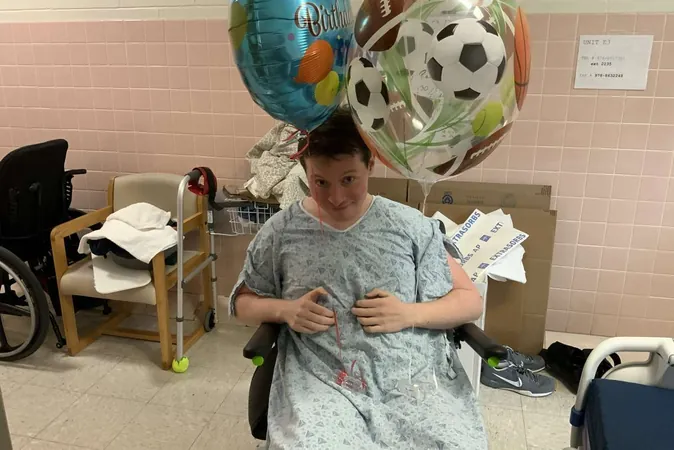
Miraculous Recovery: Man Once Declared 'Brain Dead' Defies Odds After Extreme Locked-In Syndrome
2024-11-11
Author: Chun
Introduction
In an astonishing medical breakthrough, Jacob Haendel, a man once declared “brain dead,” has emerged as the first confirmed case to recover from an extreme form of locked-in syndrome—a condition that had paralyzed him so completely that he couldn't even blink, a key method of communication used by those affected by this rare disease.
Background
Back in 2017, Jacob was a vibrant 27-year-old head chef in Boston, Massachusetts, enjoying a fulfilling life. However, his world shattered in a matter of weeks after he was diagnosed with acute toxic progressive leukoencephalopathy, a devastating brain condition that swiftly morphed into locked-in syndrome, rendering him entirely immobile and unable to express himself verbally.
Understanding Locked-In Syndrome
Locked-in syndrome can arise from various causes, including traumatic brain injury, infections, or toxic exposures, leading to a progressive and near-total paralysis of the body while leaving cognitive functions intact. For Jacob, the nightmare progressed rapidly. “By month five, I was at stage four, which they said no one ever recovers from. They told me I would enter into a coma and pass away,” he recounted, reflecting on the grim prognosis delivered by the medical team.
Initial Symptoms and Diagnosis
Jacob’s symptoms began with unusual manifestations, including a high-pitched voice, dizziness, and impaired balance. Initial tests led his doctors to suspect a stroke, but the diagnosis turned out to be far more alarming. Jacob vividly recalls the moment when eight doctors entered his hospital room, confirming the severity of his condition with disheartening looks.
Decline in Health
As his health deteriorated, he experienced unbearable chronic pain and severe fevers, ultimately leading to complete paralysis. Unlike Jean-Dominique Bauby, who famously wrote *The Diving Bell and the Butterfly* by blinking his left eye, Jacob lost even that ability, leaving him in a state of isolation. “It’s like being trapped—your brain is totally intact, but you can’t communicate with anyone,” he explained to a British news outlet, SWNS. The cruel irony of his existence was compounded by nurses who mistakenly believed he was brain dead, sharing gossip within earshot while he helplessly listened.
A Miraculous Turnaround
After ten agonizing months, a miraculous turn of events occurred when nurses noticed subtle movements in his wrist, reigniting hope among his doctors. “They told me to do it again, and that was my one shot; I focused everything I could on moving my wrist,” he recalled. This effort allowed him to regain the ability to blink, enabling him to communicate for the first time in nearly a year. His first words were a heartfelt “I love you” to his family, marking the beginning of his extraordinary recovery journey.
Rehabilitation and Progress
Following intensive rehabilitation over 18 months, which involved relearning basic movements and speech, Jacob astonished everyone by gradually regaining his ability to walk with the aid of surgeries and physical therapy. By December 2020, he achieved a remarkable milestone—returning home with round-the-clock care as the sole known individual to come back from such a dire condition.
Continuing the Journey
The story doesn't end there; in 2021, Jacob took his recovery further by co-founding a mobile app named Ahoi, aimed at assisting individuals with disabilities in tackling accessibility challenges as they navigate the outside world.
Reflection and Inspiration
Reflecting on his journey, Jacob shared, “Before this happened to me, I was always a fun, outgoing guy, but deep down, I was sad and depressed. Now, even with all the challenges, I appreciate the little things. However, it’s still been a strange and traumatic period; it will take a long time to get over.”
Conclusion
Jacob Haendel's incredible story serves as a beacon of hope, demonstrating the resilience of the human spirit and the astonishing potential of medical advancements. His journey is not just a testament to survival but also an inspiration to many who face similar debilitating conditions.


 Brasil (PT)
Brasil (PT)
 Canada (EN)
Canada (EN)
 Chile (ES)
Chile (ES)
 España (ES)
España (ES)
 France (FR)
France (FR)
 Hong Kong (EN)
Hong Kong (EN)
 Italia (IT)
Italia (IT)
 日本 (JA)
日本 (JA)
 Magyarország (HU)
Magyarország (HU)
 Norge (NO)
Norge (NO)
 Polska (PL)
Polska (PL)
 Schweiz (DE)
Schweiz (DE)
 Singapore (EN)
Singapore (EN)
 Sverige (SV)
Sverige (SV)
 Suomi (FI)
Suomi (FI)
 Türkiye (TR)
Türkiye (TR)